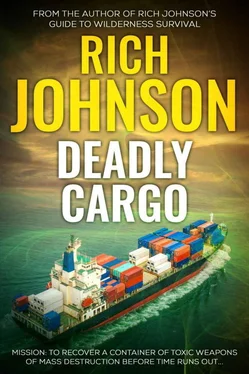“Allaahu akbar,” he choked in a broken whisper, then redirected his prayer to ask a question that had been worming about in his mind. “Why will you not help me?”
Deep in his heart he felt abandoned, and as that reality rose to his conscious mind, he fought it with prayer. “Allaahu akbar,” he began again. Before another word could be whispered, his stomach leapt to his mouth as the ship fell into a deep wave trough and everything in the container and inside his trailer became nearly weightless. He clawed at the bedding, where he lay on the mattress, trying to hold on in a plunging pitch darkness that felt as if it would never find bottom. Then came the violent shudder, as the hull slammed into the next rising wave, and Husam al Din thought he heard a deep, metallic groan, as if the ship itself were calling out to Allah to save it from destruction.
The sensations of falling, then being thrust back up, then rolling and falling again were more than he could take. His head swirled, his throat and nostrils felt the burn and stench of acid and partially digested food rising from his stomach, and there was nothing he could do to stop it. He vomited again. Where it went he could not tell in the utter blackness of this place that had become a prison to him.
Again, falling, rolling. This time, not quite so hard, but hard enough that he grabbed for the mattress and hung on to keep from being pitched to the floor. His hand found a slimy wet pool, and he knew what it was. The thought of it turned his stomach over again, and he wretched, ejecting the rest of his stomach contents into the mattress in front of his mouth. The ship hit the bottom of the trough and began the sudden rise, thrusting Husam al Din’s face into the fresh warm pool of stinking filth.
He came up sputtering and spitting, vomiting uncontrollably with dry heaves as his stomach was now empty. Then he stopped. In the darkness, the chaotic turmoil suddenly gave birth to a moment of fierce resolve.
“Allah,” – he wiped his face in an effort to be clean before presenting himself to God – “I am Husam al Din. Sword of the Faith. You may test me all you want, but I will not be broken. My life is for jihad, and I will carry out my mission if you will but let me live.”
The final words of his prayer were swallowed by the sound of wind screaming through the ranks of containers at the top of the stack on the bow of the mighty ship. Even inside the container and inside the trailer, the sound of the wind could not be stopped. A piercing shriek had for hours split the darkness with its desperate, warbling scream, fading only momentarily when the ship dropped into a hole between the waves.
Hour after hour, the constant thrumming of the hurricane drummed against the metal containers without letup. The noise and violent movement became a torture that Husam al Din accepted at the hands of Allah. If only he understood why… but then, he knew that it was an affront to challenge Allah’s wisdom. There must be a purpose in this, he thought. Perhaps it is only to make me stronger.
Something hard slammed against the side of the container, jarring him where he lay and sending the sharp noise of tearing metal through the trailer. Not knowing what to expect next, Husam al Din quickly turned himself around to face the other end of the mattress, away from the filth. Holding on as gravity once again failed and his stomach stampeded toward his throat, he strained against the sickening impulse and listened. Then a new sound surrounded him. It was the sound of water.
* * *
On the bridge deck, the intercom came alive. “Captain Sleagle,” a voice shouted above the background of howling wind.
Sleagle grabbed the mic, “Aye, this is the captain.”
“Sir, this is Yarmouth on forward deck watch. It appears we’ve lost a couple of boxes from the top of the forward stack, starboard corner.”
Sleagle steadied himself as the ship dove though the next trough and green water climbed over the bow and exploded in white foam, swallowing the forward third of the ship. He reached for his binocular and raised it to his eyes, straining to see through the glass in front of him that was streaming water in spite of the windshield wiper. His right index finger turned the focus wheel as he scanned the stack of containers nearly 800 feet ahead. The ship thundered again, as another mountainous wave boarded the bow, and Sleagle pulled the binocular down and massaged his eyes.
“Brock,” Sleagle called out to his first officer, “do you see what Yarmouth is talking about? Have we lost boxes off the starboard bow?”
The man at the far right side of the bridge deck took up his binocular and studied the cargo containers. “Hard to tell from here, sir. Could be, but the boarding seas are making it a tough call. Yarmouth is a lot closer than we are, so maybe he’s right. Wouldn’t be the first time.”
“I know, I know,” Sleagle mumbled. “But I hate losing people’s stuff.”
“Not your fault, sir,” Brock replied. “Some days old man Neptune just gets greedy.”
“Yeah, well,” the captain said, “just the same, I hate it.”
“Take it up with Neptune, next time you see him, sir.” Brock had crewed for Sleagle long enough that he felt comfortable as he chided the captain.
“Not today,” the captain retorted. “I don’t want to see the old man in person today. Seems he’s in a bad mood.”
“Aye, sir,” Brock said. “Maybe a small offering will be enough to quench his appetite.”
Sleagle looked into his first officer’s eyes from across the long bridge deck and said earnestly, “The way this storm is shaping up, we’ll be lucky if we get out of here with just a small offering.”
October 30 – Coast Guard Station Panama
“Have you heard anything yet?” Josh Adams wasn’t all the way through the door before he asked the question.
The Coast Guard officer looked up from his desk with a grim countenance and shook his head. “Nothing.”
“How does a ship the size of Desdemonda vanish?”
Pfister pushed aside his computer keyboard and leaned back in his chair. “In a storm the size and power of Yolanda, anything can happen. It’s a big ocean. Big and wide and deep.” He stood up and walked to the window, propped his arm against the frame and stared out into the glare of sunshine. “Who knows, maybe we’ll find her. I wouldn’t hold my breath, but like I said, anything can happen.”
Josh reached in his pocket and brought out a folding knife with a black four-inch blade. The tang on the blade allowed him to open and close the knife with one smooth movement of his thumb. It was an old habit, opening and closing the blade repeatedly, to burn off nervous tension.
“How many search planes are up?”
“Three.” Pfister pushed away from the window and returned to his chair. “They’ve been flying patterns since first light. I don’t have time to give you a whole course on search-and-rescue mission planning and conduct, but I’ll give you the one-minute version. Pull up a chair.” He swiveled his computer screen around so Josh could see it.
Josh settled into the seat and leaned forward toward the monitor.
Pfister pointed at a spot on the screen. “Radio communications were lost here.” Then he shifted his finger to another point. “But this is what we consider the LKP – the last known position of the ship. It was a full two hours after loss of radio contact. Coordinates at this position were derived from the GPS integral to the ship’s EPIRB – the Emergency Position Indicating Radio Beacon. The EPIRB can be activated manually, or it fires automatically if submerged. Calculating the time of eleven hours, eighteen minutes from the LKP, and factoring the prevailing sea current set and drift and the wind speed and direction, we extrapolated the predicted position of the ship at the time the search was initiated, which is where we began the search. There has been no radar contact.”
Читать дальше












